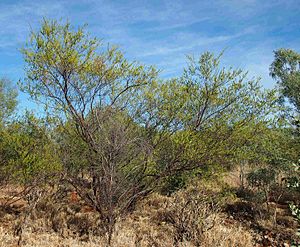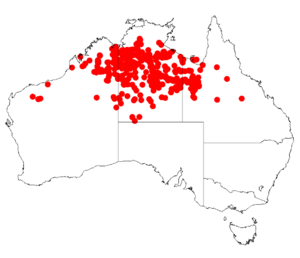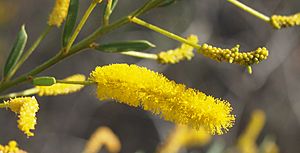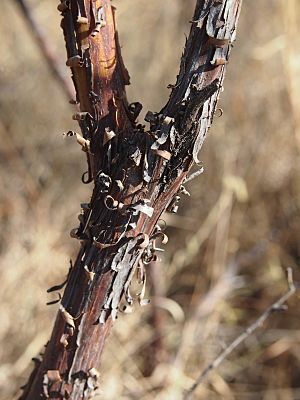Acacia lysiphloia facts for kids
Quick facts for kids Acacia lysiphloia |
|
|---|---|
 |
|
| Scientific classification |
|
| Kingdom: | Plantae |
| Clade: | Tracheophytes |
| Clade: | Angiosperms |
| Clade: | Eudicots |
| Clade: | Rosids |
| Order: | Fabales |
| Family: | Fabaceae |
| Clade: | Mimosoideae |
| Genus: | Acacia |
| Species: |
A. lysiphloia
|
| Binomial name | |
| Acacia lysiphloia |
|
 |
|
| Occurrence data from AVH | |
| Script error: The function "autoWithCaption" does not exist. | |
Script error: No such module "Check for conflicting parameters".
Acacia lysiphloia is a type of shrub, which is a small, bushy plant. It belongs to a large group of plants called Acacia, also known as wattles. This particular acacia is found naturally in the northern parts of Australia.
What is Acacia lysiphloia?
This shrub is often a bit sticky and spreads out, usually growing between 1 to 4 meters (about 3 to 13 feet) tall. It produces bright yellow flowers from May to September.
The bark of the plant is reddish-brown and has a special look called "minni ritchi" style. This means the bark peels off in thin, curly flakes, making the trunk look shaggy.
Instead of typical leaves, Acacia lysiphloia has structures called phyllodes. These are like flattened leaf stems that do the job of leaves. They are usually arranged at an angle and have a long, oval shape. Each phyllode is about 1 to 5 centimeters (0.4 to 2 inches) long and 1.2 to 7 millimeters (0.05 to 0.3 inches) wide.
The flowers have five parts, and their base (called a calyx) is very small, about 0.3 to 0.8 millimeters long. After the flowers, the plant forms flat seed pods. These pods can be straight or very curved and are typically 2 to 10 centimeters (0.8 to 4 inches) long. Inside, they hold reddish-brown seeds.
How was Acacia lysiphloia named?
This plant was first officially described by a famous botanist (a scientist who studies plants) named Ferdinand von Mueller. He wrote about it in 1859 in a scientific paper.
Sometimes, plants get different scientific names over time. For Acacia lysiphloia, there are two other names that were used in the past but are now considered the same species. These are Racosperma lysiphloia and Racosperma lysiphloium, which were described by Leslie Pedley in 1987. These are called "synonyms" because they refer to the same plant.
Where does Acacia lysiphloia grow?
You can find Acacia lysiphloia growing in different types of soil, including red sand, loam (a mix of sand, silt, and clay), and clay soils. It likes to grow on flat plains and on rocky hills.
This plant is mostly found in the tropical parts of Australia. You can see it in the Kimberley region of Western Australia, in the Northern Territory, and in northern Queensland.
It usually grows in areas with open Eucalypt (gum tree) and Acacia woodlands, in low scrub (areas with short, dense bushes), or in spinifex grasslands (areas with spiky, tough grasses).
 | Toni Morrison |
 | Barack Obama |
 | Martin Luther King Jr. |
 | Ralph Bunche |



